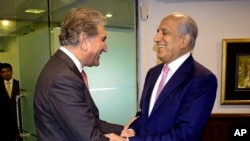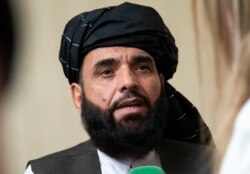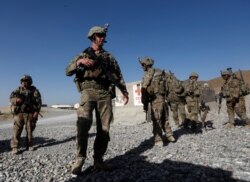The United States and Taliban teams in Doha negotiating an initial deal to end the war in Afghanistan seem to have agreed on the main agenda items and are now finalizing the details of implementing them.
"We have made excellent progress," tweeted Zalmay Khalilzad, the U.S. Special Representative for Afghanistan Reconciliation. He added that his team was now discussing with the Taliban the "technical details as well as steps and mechanisms required for a successful implementation."
Taliban spokesman Suhail Shaheen agreed that they had made headway but was vague on details.
"We affirm that there is progress in talks, but discussions continue to finalize everything," he told VOA.
Khalilzad left Doha for New Delhi Monday night for what he said was a pre-scheduled meeting in support of the Afghan peace process. But part of his team stayed behind to continue the discussions with the Taliban.
The two sides started their eighth round of negotiations Saturday on a hopeful note, both indicating they were close to the finish line. They continue to sound hopeful, but also emphasize that the few remaining steps are critical and require serious deliberations.
"Agreement on these details is essential," Khalilzad said on Twitter.
The four-part agenda included an agreement on the U.S. withdrawing its troops from Afghanistan in return for the Taliban ensuring Afghanistan does not become a haven of terrorist groups; negotiations with other Afghans, including the government in Kabul on the future form of governance; and the announcement of a comprehensive, nationwide cease-fire.
How these items are timed and linked to each other is likely the focus of negotiation. Some of the remaining differences are evident from the tweets from the two sides.
Khalilzad insisted the U.S. troop withdrawal will be "conditions-based," whereas the Taliban negotiation team spokesman Shaheen said it will be "based on a timetable."
If they reach an agreement, it could end the longest U.S. military engagement in America history.
A breakthrough in what U.S. generals called a "stalemate" occurred last year when American officials fulfilled a long-standing Taliban demand to talk to them directly, without the Kabul government, which they call a "puppet" regime.
President Donald Trump appointed Khalilzad last September to help fulfill one of his campaign promises — bring home the U.S. troops. Since then, the Afghan-born American diplomat has been almost constantly on the road, trying to develop an international, regional and national consensus on the way forward.
He has also been negotiating, along with his team, with a Taliban political team in Doha.
Last July saw another breakthrough in the process when the Taliban, who had insisted on excluding the Afghan government, agreed to meet members of the Kabul administration, albeit in their personal capacity, as part of a larger Afghan delegation.
The war in Afghanistan started in 2001, after a U.S.-led coalition attacked the country and ousted the Taliban from power for their support of al-Qaida. The militants regrouped in neighboring Pakistan and waged a bloody insurgency, slowly gaining ground on their technically superior adversaries. Today, the Taliban control more Afghan territory than they did at any time since their ouster.






